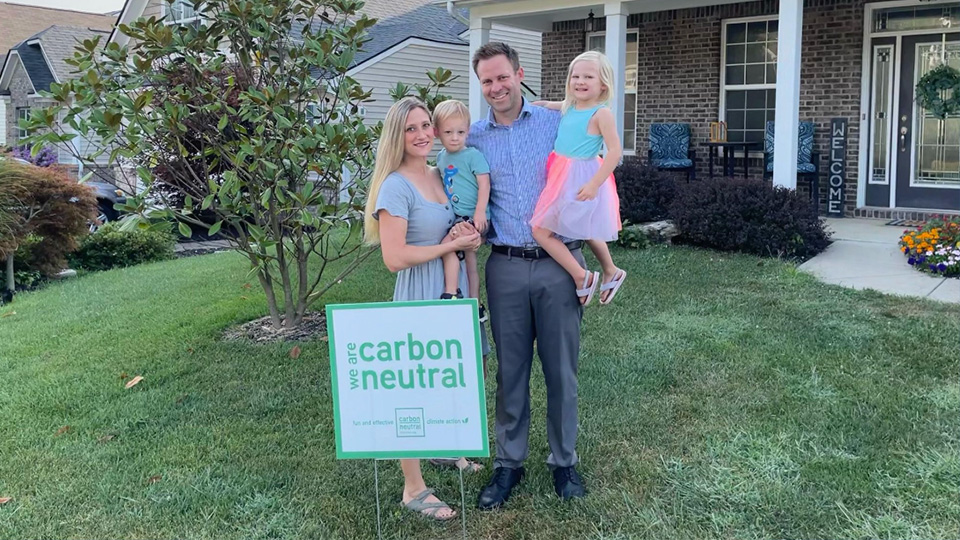Carbon Neutral Indiana seeks to change norms through bottom-up movement
Subscriber Benefit
As a subscriber you can listen to articles at work, in the car, or while you work out. Subscribe Now
Daniel Poynter often uses the idiom, “The way you eat an elephant is one bite at a time.” He uses it to talk about one of the most daunting collective issues the world is facing: climate change.
Poynter’s Indianapolis-based organization, Carbon Neutral Indiana, deploys a multi-faceted approach to reduce carbon emissions, including offsetting home and business pollution through carbon credits, inspiring Eagle Scout projects and convening climate innovators. However, his overarching goal is to breed conversation to create compounding bottom-up change and change societal norms.
“Every Boy Scout learns that when you go camping, you don’t leave candy wrappers on the campsite,” he said. “It’s the same thing with carbon emissions. You clean up your carbon emissions. It’s not that expensive. It’s the right thing to do, and eventually, it’ll be normal.”
Poynter talks about how he hopes the not-for-profit will grow and build momentum.
Part of his organization’s mission is to engage people on how they can reduce their emissions, so the single-issue not-for-profit started on the granular level by assisting homeowners with measuring and offsetting their carbon footprint.
“You don’t just put your trash in the backyard,” Poynter said. “Even though you can’t see it, you shouldn’t just put it out the window. You need to measure how much you produce and take responsibility for it, and pay to offset it.”
Poynter, a former software engineer, used 2018 to interview about 300 people about environmental issues, which became the base of his not-for-profit and motivating mission.
According to his website, the organization has offset over 15,000 tons of carbon dioxide, similar to planting 600,000 trees on 1,500 acres.
At the end of a 15-minute phone call with a homeowner, Poynter said they will have estimated their emissions and can move forward with purchasing carbon credits. Afterward, the organization will re-evaluate its clients’ carbon footprint annually. Over 500 households have become carbon neutral through his program, he said.
A factor people often see as a barrier to environmental solutions is cost. However, Poynter said that with their model, they find solutions based on the free market, subsequently driving down prices. For businesses, he said becoming carbon neutral costs less than one-fourth of a percent of revenue. He compares the cost for homeowners to a water or trash bill at about $20.
Another important piece, Poynter said, is how they help people understand climate change and how it relates to them. The best metaphor he found is calling emissions “carbon trash” and telling people there is a need to remove the carbon trash as much as physical garbage.
“I don’t really care how you reduce a carbon ton,” he said. “All I care is that you did it and that it’s verified.”
There are dozens of ways to offset carbon emissions, he said, including protecting forests in Alaska, capturing methane at a landfill in Virginia and planting trees in Iowa. He mentions he has a vast web of connections so that he can connect business owners with people who can solve issues like adding solar panels.
Now, he is aiming bigger by working with businesses. He mentioned an ice cream shop, an architecture firm and now Bloomington-based Loren Wood Builders. The company has an energy-efficient office with solar panels, electric trucks and low-carbon building materials but is offsetting its electricity and natural gas outputs by working with Carbon Neutral Indiana — making Loren Wood Builders the not-for-profit’s biggest client yet with 60 employees.
What sets Carbon Neutral Indiana apart, Poynter said, is how they support free-market entrepreneurism, convene thinkers and innovators and commit to third-party-verified, outcome-based solutions.
“What makes us different is this belief in freedom and innovation and bottom-up solutions,” he said, “and that the future can actually be better than the past.”
His goal is for Indiana to one day be carbon neutral instead of ranking in one of the top states producing the most carbon emissions. It’s a goal he said shouldn’t be punted down the line; he said change can be made immediately. He called it a bad habit that’s hurting the world.
“My point is that you don’t need to wait till 2050. If you produce trash, and you throw it in your backyard, would you make a plan to stop doing that by 2050?” he asks. “Or would you stop doing that now? You should stop doing it now.”
Indiana has long been cast as behind the curve for renewable energy and climate change initiatives. However, Poynter disagrees; he said there is a significant number of Hoosiers conducting conservation efforts, but it’s not talked about. He mentioned the northwest Indiana Mammoth Solar project and Ball State University’s geothermal energy project as examples.
“I’m trying to let people know that Indiana is not so bad,” he said. “There’s a lot of good things happening here.”
